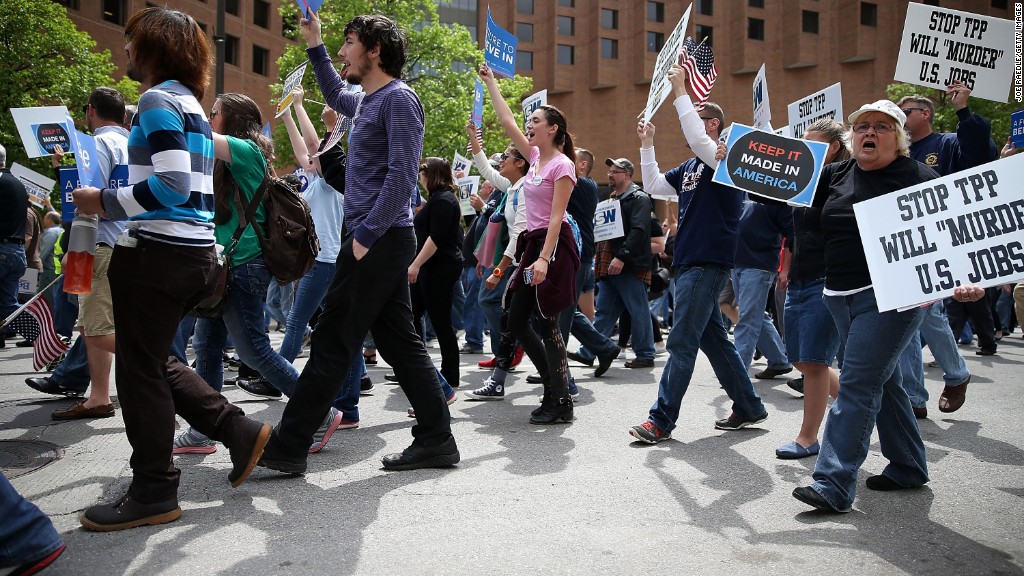
The 1,400 of workers building furnaces for Carrier in Indianapolis are at the center of a high-profile tug of war between President-elect Donald Trump and the plant's corporate parent, United Technologies.
Trump's pledge to stop employers like Carrier from moving jobs overseas was central to his campaign, and an issue that's paramount to the Midwest blue collar workers who helped elect him.
At the same time, United Technologies (UTX), which owns Carrier, is a leading defense contractor that benefits from billions of dollars in federal spending, so it needs to maintain good relations with the incoming Trump administration.
The company announced in February that it will close two Indiana plants, the Carrier plant and a United Technologies Electronic Controls plant in nearby Huntington, IN, which employs 700. It plans to send that work to Mexico starting next year. The move will save the company $65 million a year in labor costs, according to the union, a figure the company does not dispute.
Trump and Carrier both confirmed on Thanksgiving day that they're in talks to keep at least some of those jobs in the U.S.
"I am working hard, even on Thanksgiving, trying to get Carrier A.C. company to stay in the U.S. (Indiana). Making progress - Will know soon!" Trump tweeted Thursday morning.
On the same day, Carrier confirmed those talks, but said that it had nothing to report.
Trump specifically promised to keep the Carrier jobs in the U.S. on the campaign trail.
"Here's what's going to happen," Trump told a crowd in Indianapolis last April. "I'll get a call from the head of Carrier and he'll say, 'Mr. President, we've decided to stay in the United States. That's what's going to happen -- 100%."
Now Trump's critics say he has to deliver on that promise, and that if he doesn't it will be a betrayal of the people who voted for him.
"All of us need to hold Mr. Trump accountable to make sure that he keeps this promise," said Sen. Bernie Sanders in a statement last weekend. "Let's be clear: it is not good enough to save some of these jobs. We cannot rest until United Technologies signs a firm contract to keep all of these good-paying jobs in Indiana without slashing the salaries or benefits workers have earned."
Related: On Thanksgiving table: Trump, U.S. jobs and Mexico
The president of the local chapter of the United Steelworkers union that represents Carrier workers isn't confident that Trump can keep the jobs from moving.
"I think it's a long shot. I hope they aren't playing with people's emotions," said Chuck Jones, the local's president, told CNN. Jones supported Hillary Clinton in the campaign.
Jones said if Trump it successful, it's because of the clout that United Technologies' defense business gives him in talks.
"If Trump has any leverage, it's the government contracts," he said.
Related: Deere plows higher on Trump construction boom hopes
United Technologies collects about $5.6 billion in annual revenue from U.S. government contracts, according to company filings, which is equal to about 10% of its overall revenue. United Technologies also relies on the U.S. government for a large chunk of the $1.5 billion in research and development grants that it receives from its customers.
Even a slight reduction in either of those sources of government funds would wipe out any savings United Technologies might see from closing the Indiana plants.
Company officials would not comment on its government contracts or the role they might play in talks with Trump. Nor would it discuss what incentives it might be seeking to stay put. But it is on the record, as are most other major multinational businesses, as wanting to see a cut in corporate tax rates, especially as it applies to cash earned overseas.
Many Congressional Republicans have long advocated a change in tax law so that money earned abroad can be brought home without being subject to a high tax rate, if any at all. United Technologies' filings say 85% of the cash on its balance sheet, or about $6 billion, remains with its overseas subsidiaries due to tax issues.
"Our intention is to reinvest these earnings permanently or to repatriate the earnings only when it is tax effective," the company said in its most recent 10K filing.

